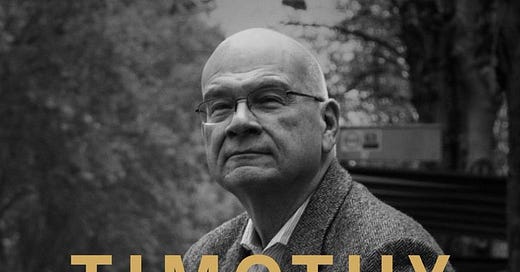“From the inner ring of the gospel in his college conversion, Keller branched out for insight wherever he could find it. He grabbed from John Stott’s preaching over here and Herman Bavinck’s worldview over there. He reached for new urbanism from Jane Jacobs, and existentialist philosophy from Søren Kierkegaard. Long before he’d found even moderate fame, his rings grew to include Jack Miller and R. C. Sproul, Elisabeth Elliot and Barbara Boyd, Richard Lovelace and Harvie Conn, not to mention little-known pastors such as Kennedy Smartt. Keller opted for synthesis over antithesis. When he added rings, he didn’t subtract others.”
Timothy Keller by Collin Hansel
Every individual who has ever lived has a biography like this. This is not a story of Timothy Keller; it is a story of the influences of Timothy Keller. We often fancy the thought that we are living independently, but the truth is that we are not. We are the sum of the people we meet, the books we read, and the environment we spend time in.
Timothy Keller set out as an ordinary Christian who grew up with a legalistic mum; this experience pushed him away from the faith of his parents. He only changed when he experienced a revival on campus. Keller had always been a brilliant student; he met another brilliant girl in seminary, Kathy Keller. They hitched their wagon together and spent the next 48 years together. Some of the experiences that shaped Keller had Kathy involved, too; it explains the united vision for life that they developed.
Keller built a church largely on engaging with those he disagreed with. This is unique. Nearly every group wants to maintain its uniqueness and pushes away outsiders. But not Keller. Keller believed it was his mission to reach the world of the skeptic, the world of unbelievers, the world of people who hate the church, and those “in the world.” This view did not develop randomly; it was a product of so many influences that shaped Keller. John Stott. RC Sproul. CS Lewis. RR Tolkien. Elisabeth Eliot. Etc.
The deep lesson from this book is that the independent life we claim to live is not really independent. We are all products of all the influences that we have exposed our lives to. Keller’s influences led him to one of the most beautiful, resilient, and God-filled lives. Keller died last year after battling with cancer. He had started writing a memoir when he realized he had cancer. He ditched the memoir and started writing more about the beauty of God in pain, suffering, and affliction. He wrote about how we can see God working even in our suffering. Despite his pain, Keller insisted that God had a plan for this world. He insisted that this temporary victory of tragedy is not the final battle. The war had already been won, he was sure! This temporary loss was the result of the chaos that was set in the Garden of Eden. Our King is coming. Our redemption is on the way!
When Keller died, I read so many tributes to him. One consistent theme in all of them is how he always treated those he disagreed with empathy and sincerity. He does not shy away from disagreements; he does not try to push them under the carpets; rather, he encourages that the disagreements be brought out and dealt with logically, with grace, and with sincerity of purpose. One could still finish a conversation with Keller, and their views would not be changed, but you would leave with a feeling that he listened genuinely, understood you clearly, and spoke with clarity about his beliefs.
In 2017, he was nominated to receive the Abraham Kuyper Prize in reformed theology. However, many students and alumni from Princeton opposed his nomination due to his view on women's ordination. The prize was withdrawn, but he was invited to deliver an address at the Kuyper Conference. You know what Keller did? He attended the conference and delivered his address! Incredible. We can disagree, but we can treat each other with grace. Keller rose above the fray. It has been his life's work.
This book is also a celebration of books. A celebration of what books can do to a person. For Keller, they turned him into a preacher who could preach solid sermons, a preacher who could reach the skeptics, and a preacher who could teach to celebrities and to an average person. Everyone needs Jesus, and Keller was a very good Jesus donkey. He did his work well, partly because he read the right books.
The question is not whether others will influence you; the question is who will influence you. You know what's my suggestion? Expose your life to the kind of people you want to become. Read the kind of books that push you to become that kind of person. Connect with the people who shape you to become that kind of person. Don’t be indifferent. Don’t wait for chance. Do it intentionally.
Warren Buffet says, “Show me your heroes, and I will tell you will become.” You are going to reach the end of your life, and you will realize you've become something. I don't know- what it will be, but there is a high chance that you will look like your influences. Collect them with care.





Thank you for such an instructive review!